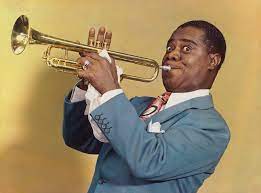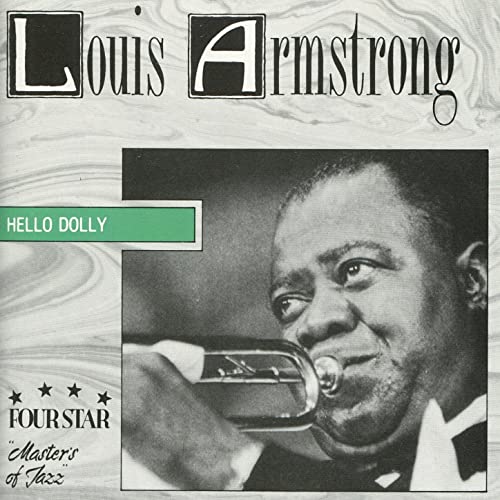
Armstrong, Louis
Louis Daniel Armstrong (August 4, 1901 – July 6, 1971), nicknamed “Satchmo“, “Satch“, and “Pops“, was an American trumpeter and vocalist who is among the most influential figures in jazz. His career spanned five decades and different eras in the history of jazz.
Armstrong was born and raised in New Orleans. Coming to prominence in the 1920s as an inventive trumpet and cornet player, Armstrong was a foundational influence in jazz, shifting the focus of the music from collective improvisation to solo performance. Around 1922, he followed his mentor, Joe “King” Oliver, to Chicago to play in the Creole Jazz Band. In Chicago, he spent time with other popular jazz musicians, reconnecting with his friend Bix Beiderbecke and spending time with Hoagy Carmichael and Lil Hardin. He earned a reputation at “cutting contests” and his fame reached band leader Fletcher Henderson. Henderson persuaded Armstrong to come to New York City, where he became a featured and musically influential band soloist and recording artist. Hardin became Armstrong’s second wife and they returned to Chicago to play together and then he began to form his own “Hot” jazz bands. After years of touring, he settled in Queens, and by the 1950s, he was a national musical icon, assisted in part, by his appearances on radio and in film and television, in addition to his concerts.
With his instantly recognizable rich, gravelly voice, Armstrong was also an influential singer and skillful improviser, bending the lyrics and melody of a song. He was also skilled at scat singing. Armstrong is renowned for his charismatic stage presence and voice as well as his trumpet playing. By the end of Armstrong’s life, his influence had spread to popular music in general. Armstrong was one of the first popular African-American entertainers to “cross over” to wide popularity with white (and international) audiences. He rarely publicly politicized his race, to the dismay of fellow African Americans, but took a well-publicized stand for desegregation in the Little Rock crisis. He was able to access the upper echelons of American society at a time when this was difficult for black men.
Armstrong appeared in films such as High Society (1956) alongside Bing Crosby, Grace Kelly, and Frank Sinatra, and Hello, Dolly! (1969) starring Barbra Streisand. He received many accolades including three Grammy Award nominations and a win for his vocal performance of Hello, Dolly! in 1964. In 2017, he was posthumously inducted into the Rhythm & Blues Hall of Fame.
During his long career he played and sang with some of the most important instrumentalists and vocalists of the time; among them were Bing Crosby, Duke Ellington, Fletcher Henderson, Earl Hines, Jimmie Rodgers, Bessie Smith and perhaps most famously Ella Fitzgerald. His influence upon Crosby is particularly important with regard to the subsequent development of popular music: Crosby admired and copied Armstrong, as is evident on many of his early recordings, notably “Just One More Chance” (1931). The New Grove Dictionary of Jazz describes Crosby’s debt to Armstrong in precise detail, although it does not acknowledge Armstrong by name:
Crosby … was important in introducing into the mainstream of popular singing an Afro-American concept of song as a lyrical extension of speech … His techniques—easing the weight of the breath on the vocal cords, passing into a head voice at a low register, using forward production to aid distinct enunciation, singing on consonants (a practice of black singers), and making discreet use of appoggiaturas, mordents, and slurs to emphasize the text—were emulated by nearly all later popular singers.
Armstrong recorded two albums with Ella Fitzgerald: Ella and Louis, and Ella and Louis Again for Verve Records, with the sessions featuring the backing musicianship of the Oscar Peterson Trio and drummers Buddy Rich (on the first album), and Louie Bellson (on the second). Norman Granz then had the vision for Ella and Louis to record Porgy and Bess.
His recordings for Columbia Records, Louis Armstrong Plays W.C. Handy (1954) and Satch Plays Fats (all Fats Waller tunes) (1955) were both being considered masterpieces, as well as moderately well selling. In 1961 the All Stars participated in two albums—The Great Summit and The Great Reunion (now together as a single disc) with Duke Ellington. The albums feature many of Ellington’s most famous compositions (as well as two exclusive cuts) with Duke sitting in on piano. His participation in Dave Brubeck‘s high-concept jazz musical The Real Ambassadors (1963) was critically acclaimed, and features “Summer Song”, one of Armstrong’s most popular vocal efforts.
